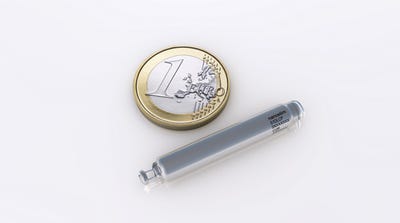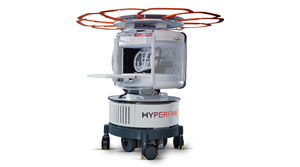October 28, 2016
The company confirms lost telemetry and pacing output among a small portion of the leadless pacemakers implanted.
Chris Newmarker
 St. Jude Medical's technical woes appear to be continuing, and this time they involve the company's Nanostim leadless pacemaker.
St. Jude Medical's technical woes appear to be continuing, and this time they involve the company's Nanostim leadless pacemaker.
The Little Canada, MN-based medical device company confirmed on Friday that it has halted implanting the pacemaker. There have been seven cases, 0.5% of the total, in which there was lost telemetry and pacing output; the company reports no patient injuries.
Medtronic beat St. Jude earlier this year in the race to get a leadless pacemaker to market in the U.S., winning FDA approval for its Micra pacemaker in April. The Nanostim pacemaker, which has a CE Mark, is still under FDA review. Implanted inside the heart through catheter-based procedures, the next-gen devices are about the size of a large vitamin pill and do away with the need to run leads to the heart, the source of many pacemaker-related problems.
"We put our patients first, and our voluntary pause of Nanostim implants worldwide is another example of our commitment to protecting patients, and we are currently working to ensure our physician partners worldwide have the information they need to effectively manage those patients. We remain committed to developing leadless pacing technology and will continue to work to redefine the pacing options available to patients in the future," Mark Carlson, MD, St. Jude Medical's chief medical officer, said in a statement shared by the company.
The news comes only weeks after St. Jude Medical announced a serious ICD recall involving early depletion of lithium batteries. Batteries can run out within 24 hours of the devices' low-battery alert, with a total 349,852 affected devices remain actively implanted worldwide, according to the company. On top of that, St. Jude has taken short-selling investment firm Muddy Waters and cybersecurity outfit MedSec to court over their claims of cybersecurity problems in St. Jude devices.
The Nanostim problems are unrelated to premature battery depletion seen in high voltage medical devices related to lithium deposits, according to St. Jude Medical spokesperson Justin Paquette.
Wells Fargo analyst Larry Biegelsen, however, says the Nanostim problems, though unrelated to the ICDs, are still battery related. The company plans to plans to resubmit Nanostim by the end of the year with a new battery from another battery manufacturer, Biegelsen said in an equity research note.
This is the second pause for Nanostim. Device sales were previously halted in 2014 after a postmarketing study involving 200 patients discovered two patient deaths and six instances of perforation.
Biegelsen does not expect the Nanostim news to have a major impact on St. Jude Medical financial results, or affect Abbott Laboratories's planned $25 billion acquisition of the company. "This will, however, be disappointing news to thought leaders in the field who are excited about the potential for leadless pacemakers in the future," Biegelsen said.
Chris Newmarker is senior editor of Qmed. Follow him on Twitter at @newmarker.
Like what you're reading? Subscribe to our daily e-newsletter.
[Image courtesy of St. Jude Medical]
About the Author(s)
You May Also Like


